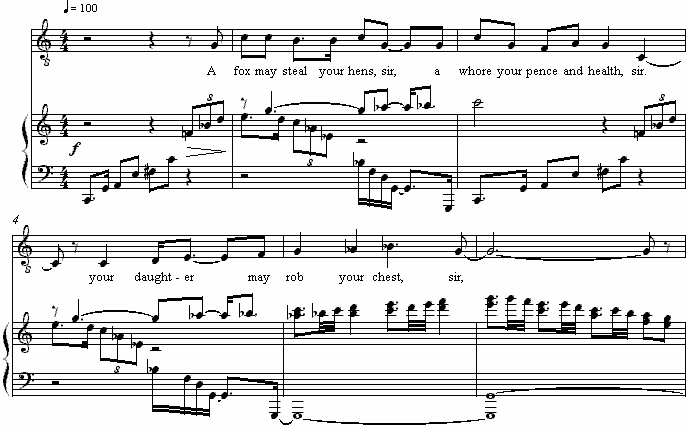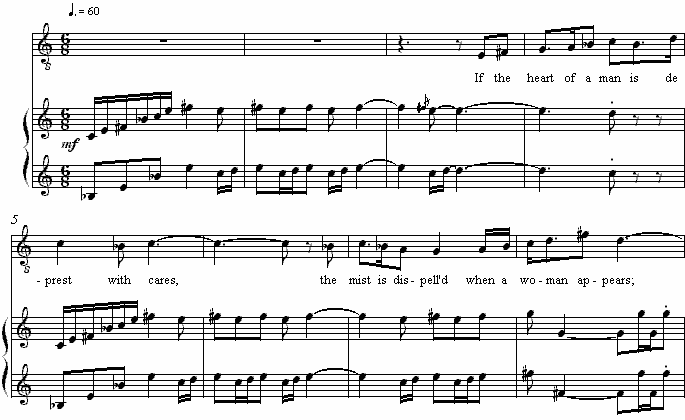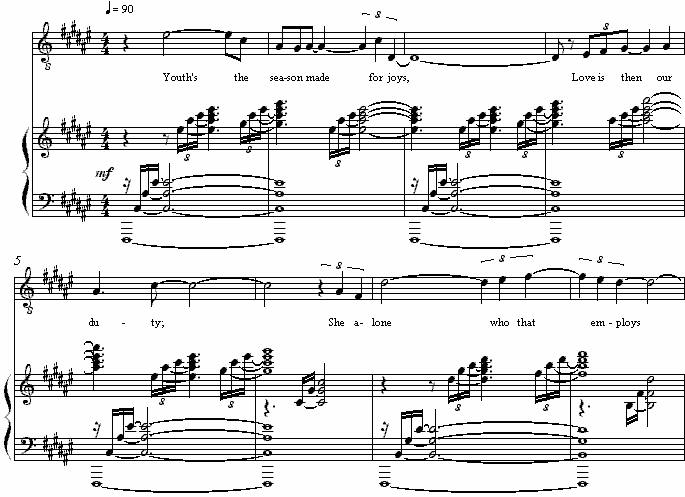Music and Texts of GARY BACHLUND Vocal Music | Piano | Organ | Chamber Music | Orchestral | Articles and Commentary | Poems and Stories | Miscellany | FAQs |
Three Airs from the Beggar's Opera - (2005)
John Gay
for tenor and piano
i. A Fox May Steal Your Hens, Sir (Air XI) [ 2 pages, circa 50' ]
A fox may steal your hens, sir,
A whore your health and pence, sir,
Your daughter may rob your chest, sir,
Your wife may steal your rest, sir,
A thief your goods and plate.
But this is all but picking,
With rest, pence, chest, and chicken;
It ever was decreed, sir,
If Lawyer's hand is fee'd, sir,
He steals your whole estate.
ii. If the Heart of a Man (Air XXI) [ 3 pages, circa 1'40" ]
If the heart of a man is deprest with cares,
The mist is dispell'd when a woman appears;
Like the notes of a fiddle, she sweetly, sweetly
Raises the spirits, and charms our ears.
Roses and lillies her cheeks disclose,
But her ripe lips are more sweet than those.
Press her,
Caress her,
With blisses,
Her kisses
Dissolve us in pleasure, and soft repose.
iii. Youth's the Season Made for Joys (Air XXII) [ 4 pages, 2'10" ]
Youth's the season made for joys,
Love is then our duty;
She alone who that employs,
Well deserves her beauty.
Let's be gay,
While we may,
Beauty's a flower despis'd in decay.
Let us drink and sport to-day,
Ours is not tomorrow.
Love with youth flies swift away,
Age is nought but sorrow.
Dance and sing,
Time's on the wing,
Life never knows the return of spring.
Total cycle [ 9 pages, circa 4'40" ]
John Gay
John Gay (1685-1732) was an English poet and dramatist, a friend of Pope and Swift. He is remembered for his play The Beggar's Opera (1728), which was the basis for Kurt Weil and Bertolt Brecht's classical work Dreigroschenoper (1928, The Threepenny Opera). The play was highly successful and enabled Gay to spent more money on gambling and drinking. Its sequel, Polly (1729), was supposedly suppressed by the prime minister Robert Walpole, who thus only incited people to buy its printed version.
Let us drink and sport to-day,
--Ours is not to-morrow:
Love with youth flies swift away,
--Age is naught but sorrow.
---Dance and sing,
---Time's on the wing,
Life never knows the return of spring.
(from The Beggar's Opera)
John Gay was born at Barnstaple in Devon, lost his parents at an early age and was brought up by his uncle, the Reverend John Hammer. Educated at Barnstable Grammar School and after finishing school, Gay started as an apprentice to a silk merchant in London. He disliked the work, but a genial person, Gay soon found his way to the literary and social circles. In 1712-14 he worked as a steward in the household of the Duchess of Monmouth. Gay then became secretary to Lord Clarendon, Tory envoy to Hanover, but with the death of Queen Anne and the fall of the Tory government he was left to his own resources. In his last years Gay lived mainly with two of his patrons, the Duke and Duchess of Queensberry in Wiltshire. In 1732 he returned to London, where he died on December 4. Gay was buried in Westminster Abbey. In his own epitaph the writer did not give up his humour:
"Life is a jest, and all things show it;
I thought so once, and now I know it."
In 1708 Gay published "Wine," a poem to celebrate the Act of Union between England and Scotland and in 1711 he published the pamphlet The Present State of Wit. During these years he met Pope and began to visit the fashionable coffee-houses. In London Gay supported himself by working as a journalist. The What d'ye Call It (1715) was Gay's first satirical play, which he finished at the age of 30.
The Beggar's Opera - the earliest of the 'ballad operas' which was meant as entertainment as opposed to the serious Italian operas - was first performed when the author was 43. John Pepusch, a German musician, wrote popular songs for the play, as had Benjamin Britten.
"A fox may steal your hens, sir" suggested then and suggests still that it is the lawyer that will steal "your whole estate." Other poets over centuries have taken up this theme, and it seems as current today as it once was. Certainly the upper political class throughout the Western world has been dominated by lawyers who have somehow amassed wealth alongside their "public service."

The second song for tenor features the dissonance of "deprest" seconds, dispelled for a time "when a woman appears." And yet, as with the so-called fickle sex, this man too continues to heed the depressed cares of the world.

"Let's be gay, while we may" is tempered in this third air with the more solemn recognition that "Time's on the wing" and "Life never knows the return of spring."

